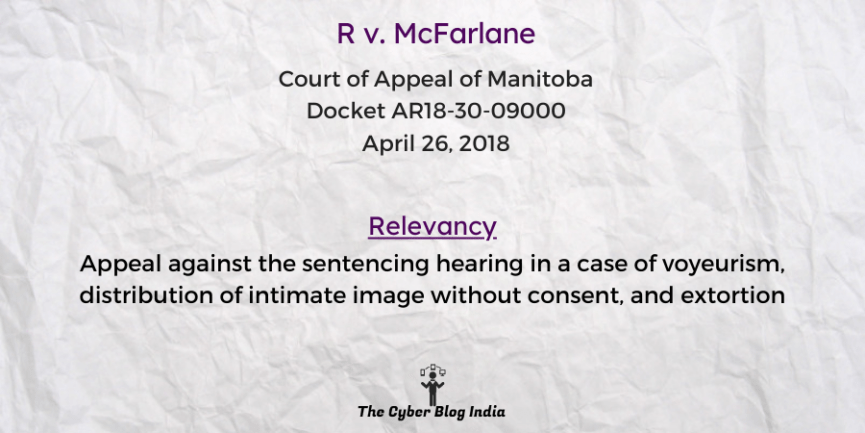R. v. McFarlane

R. v. McFarlane
2018 MBCA 48
In the Court of Appeal of Manitoba
Docket AR18-30-09000
Before Justice D.M. Cameron, Justice W.J. Burnett, and Justice C.J. Mainella
Decided on April 26, 2018
Relevancy of the Case: Appeal against the sentencing hearing in a case of voyeurism, distribution of intimate image without consent, and extortion
Statutes and Provisions Involved
- The Criminal Code, 1985 (Section 162, 162.1, 162.2, 346(1), 486.4, 688, 718.2)
Relevant Facts of the Case
- This case involves an appeal against the appellant’s sentencing. The trial court convicted him of voyeurism, distribution of an intimate image without consent, and extortion.
- The defendant surreptitiously recorded a friend undressing and showering in 2010. He later attempted to extort sexually explicit material from her by threatening to disseminate recorded images.
- The sentencing hearing involved arguments from the defendant’s counsel regarding the priority of rehabilitation and the principle of restraint. The trial court judge considered aggravating and mitigating factors, ultimately favouring the objectives of denunciation and deterrence.
- The sentencing decision considered his personal background, including a privileged upbringing, education, remorse for his actions, and involvement in a new relationship.
Prominent Arguments by the Counsels
- The appellant’s counsel argued that the trial court judge erred in his approach to multiple offences by considering the overall length of the sentence first. The judge ignored the principle of totality. The counsel argued that the judge overemphasised the objectives of denunciation and deterrence despite a youthful first offender.
- The respondent’s counsel argued that the judge’s consideration was adequate for appellate review. Further, there was no basis to interfere with the judge’s conclusion, which favoured the objectives of denunciation and deterrence. The counsel also emphasised the accused’s high moral culpability and the significance of prior extortion sentences in determining the appropriate sentence.
Opinion of the Bench
- The judge erred in principle by first determining the total sentence. He failed to explain the fit sentence for each count and adjustment for totality.
- Despite the error, the judge’s decision was deemed harmless in effect. The combined sentence of 18 months imprisonment, followed by three years of supervised probation, is fit.
Final Decision
- The court partially allowed the appeal by modifying and adjusting the sentences for voyeurism and extortion.
Aditi Mangesh Sawant, an undergraduate student at NMIMS Kirit P Mehta School of Law, Mumbai, prepared this case summary during her internship with The Cyber Blog India in January/February 2024.
